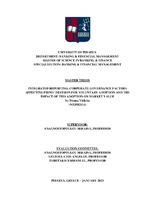Integrated reporting : corporate governance factors affecting firms' decision for voluntary adoption and the impact of this adoption on market value

Master Thesis
Author
Ντούσα, Βιολέττα
Ntousa, Violetta
Date
2023-01View/
Keywords
Integrated reporting ; Corporate governance ; Corporate Social Responsibility (CSR) ; Board of directors ; Market Value ; Eurozone ; Ohlson modelAbstract
Integrated Reporting (<IR>) is an emerging phenomenon having attracted the interest of both the academic literature and business world during the last few decades. <IR> introduces the concept of a complete report including both financial and sustainability information. Its objective is to provide a holistic view of enterprises to all interested parties, especially to capital providers, demonstrating the linkages of such information to business vision, long-term targets, strategy and business model and highlighting the way in which companies create or/and sustain value over time. The application of <IR> is mandatory for
the jurisdiction of South Africa for all entities listed on the Johannesburg Stock Exchange, whereas its adoption is optional anywhere else around the globe.
The purpose of the current thesis is to examine the association between the level of corporate governance quality within organizations and their decision for adopting the integrated reporting approach voluntarily as well as to examine the relationship between voluntary integrated reporting adoption and market valuation through the use of the accounting-based valuation model of Ohlson (1995).
Our empirical analysis focuses on a sample of firms based in Eurozone, where the regime about the application of integrated reporting is voluntary. Eurozone was selected due to the fact that the vast majority of the existing literature when analyzing voluntary adoption of <IR>, even sparse, examines international samples (Hsiao et al., 2019; Obeng et al, 2021) despite the fact that a large number of companies following <IR> is based in Eurozone countries. Our empirical research covers years 2007-2021, even though the concept of <IR> expanded rapidly since 2005 (White, 2005; Todd, 2005). The first two years of <IR> spread (years 2005-2006) are left out of our sample to ensure results will be more representative of the actual relationships. For the conduction of our empirical research, we used annual data retrieved from Worldscope, Datastream and ESG databases of Refinitiv.
Our findings indicate that firms with stronger corporate governance systems are more likely to practice integrated reporting in line with previous studies (Frías-Aceituno et al., 2013; Stacchezzini et al., 2016; Fasan & Mio, 2017; Vitolla et al., 2020). Additionally, our results show that implementation of integrated reporting is positively valued by capital market participants, which is reflected through higher market values, corroborating evidence of prior empirical research (Baboukardos & Rimmel, 2016; Lee & Yeo, 2016; Arguelles et al., 2017; Zhou et al., 2017; Barth et al., 2017). Our findings may be useful for standard setters in identifying how firms can be further motivated to adopt integrated reporting through corporate governance and for firms to understand that significant benefits can be obtained from transition to an integrated reporting approach.


